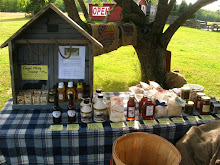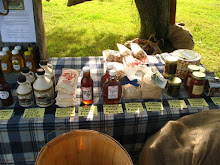Last year at the Nellis farm we found that weeds were our number one down fall. The over growth of weeds severely impacted our ability to concentrate on further planting and production for the full extent of the 2008 growing season.
So, armed with information from the class that Kelli and Scarlet went to in Madison we've been considering various options regarding weed control. Of course as most folks know we grow our vegetables free from any kind of chemicals such as herbicides. We don't even think about it. It's just not an option.
In the past we have used wasted hay and used straw from our animals. This works well but, we don't have near the quantities to cover everything. Plus not every crop will do well with these if they are warm loving plants since these materials used as mulch tend to cool the soil.

The picture to the right is a heavily mulched bed of carrots from 2008. Grass clippings and dried leaves can be used as mulch also. But, these are materials that will need to be stock piled if we are going to have enough quantity to mulch on a larger scale.
To the left are some examples of black plastic mulch. This mulch has a warming effect on the soil so warm loving crops are said to do well with this. On the other hand cool loving crops would do poorly. Interestingly there are a variety of colors available with  plastic mulch since it is found that plants react differently to different colors. The use of various colored mulch is a whole new arena so for us we will just stick with black and get used to that first before we delve into a more complex technique.
plastic mulch since it is found that plants react differently to different colors. The use of various colored mulch is a whole new arena so for us we will just stick with black and get used to that first before we delve into a more complex technique.
 plastic mulch since it is found that plants react differently to different colors. The use of various colored mulch is a whole new arena so for us we will just stick with black and get used to that first before we delve into a more complex technique.
plastic mulch since it is found that plants react differently to different colors. The use of various colored mulch is a whole new arena so for us we will just stick with black and get used to that first before we delve into a more complex technique.A down side to plastic mulch is you have to water from underneath requiring the extensive use drip irrigation systems.
The plus side is that since the water doesn't readily evaporate the plastic helps keep the soil moist.

Synthetic fabric mulch is water permeable so over head watering is possible with that plus rain water can also pass through which is something plastic mulch does not do. That too being another down side to plastic in that you need to water even if it rains.
Upon further study it does seem these weed control options are a good alternative for the organic grower. So we are eager to experiment with some of these methods this growing season and look forward to not having to spend near as much time eradicating weeds.




0 comments:
Post a Comment